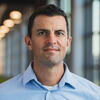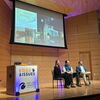Processing Your Payment
Please do not leave this page until complete. This can take a few moments.
- News
-
Editions
View Digital Editions
Biweekly Issues
- December 1, 2025
- Nov. 17, 2025
- November 03, 2025
- October 20, 2025
- October 6, 2025
- September 22, 2025
- + More
Special Editions
- Lists
- Viewpoints
-
Our Events
Event Info
Award Honorees
- Calendar
- Biz Marketplace
Book smart | Health care professionals look to literature for better ways of caring for patients
That dispassionate approach to health care is not intentional, but a function of the continual strain health care workers are under. But Hamilton, a physician assistant at the Togus VA Medical Center in Augusta, says one thing that has helped him empathize with his patients is reading.
As part of a program created by the Maine Humanities Council that brings literature into the health care workplace, Hamilton read The Spirit Catches You and You Fall Down by Anne Fadiman. The nonfiction book tells the story of Hmong immigrants from Southeast Asia living in California, and the extreme disconnect that occurs between their idea of health care and the Western idea of health care. "That really gave me a perspective on other cultures and it also gave me a sense of trying to put myself in the patient's shoes and seeing things from their perspective," Hamilton says. "Most of the books we read try to see different perspectives and deal with a person from where they are coming from."
With emergency rooms packed, hospital beds full, nurse shortages projected and Maine's health care industry straining under an aging population, the Literature & Medicine program is an experiment at improving patient health care in a unique way that also benefits the health care professionals who participate.
The idea behind the program is that reading and discussing literary accounts of illness and the human condition will help physicians and other direct care givers view the health care system through a patient's eyes and create understanding. The goal is that the physician will carry that empathy into his or her next encounter with a patient, which in turn could improve a patient's experience and the care they receive. "One thing I've gained from this Literature & Medicine program is the fact that I'm more present with each patient I see than I ever have been before," Hamilton says. "I've also come to realize that when patients feel that you don't care about them, they don't seem to get better. We can give them all the medicine in the world, but unless they feel like you care, they won't get better."
"The thing is it's so simple, but it does make a big difference," says Elizabeth Sinclair, program coordinator of the Literature & Medicine program. One hospital, Stephens Memorial Hospital in Norway, is even touting the program in its application to be designated a Magnet hospital by the American Nursing Association, she says.
Sinclair says the program has been so effective that MHC, with help from a grant from the National Endowment for the Humanities, has helped launch the program at hospitals and health care facilities in 18 other states, including nearly every state on the Eastern seaboard, as well as some farther afield like Hawaii and Montana.
The Literature & Medicine program, which MHC launched in 1997 at Eastern Maine Medical Center in Bangor, brings together people who work within hospitals or community health care facilities to read and discuss literature. The program isn't your average book club. Nor is it like the English lit class you may have taken in college. Instead, what's read in the Literature & Medicine program must have some relevance to health care ˆ whether a novel dealing with death or a poem about the human condition or a memoir about living with illness. The definition is loose enough, however, that readings have included such eclectic choices as Homer's The Iliad and Franz Kafka's story The Metamorphosis.
Everyone is welcome ˆ from physicians to nurses to support staff to administrators to janitors. In the past 10 years, the program has been used at 26 hospitals and community health centers across Maine.
New perspectives
Quality health care certainly involves more than the physicians and nurses that work at a patient's bedside. In fact, the largest percentage of participants ˆ nearly a third ˆ in the Literature & Medicine program are in administrative or support staff positions, according to a report completed last year by the University of Southern Maine's Muskie School of Public Service. The next largest groups of participants are nurses (20%) and physicians (12%), followed by counselors, therapists and social workers. "Anybody who has any involvement has a really important place in health care," Sinclair says.
Sometimes Dina McKelvy, a health librarian at Maine Medical Center, forgets that fact. While patients at Maine Med may never meet McKelvy, the work she does to maintain the Portland hospital's medical databases and library of medical journals ˆ both of which physicians and nurses access on a daily basis ˆ can have a direct impact on the treatment those patients receive.
The Literature & Medicine program, however, helps her appreciate her role as she meets and discusses health care with other people in other roles at the hospital. "I think there's that renewed sense of your unique part of it," McKelvy says. "And so instead of feeling like a cog, you feel more like part of the health care mix."
Tom Lizotte is director of marketing at Mayo Regional Hospital in Dover-Foxcroft. Lizotte has been the council's liaison to the hospital since 1998, when the 25-bed hospital became the second pilot hospital in the state. For Lizotte, the program has offered him a way to "get in the patient's head" to understand what kind of health care experience Mayo should be striving to provide.
The program also tears down walls in the culture of a hospital where it's common for a nurse to only address a physician by using formal titles, Sinclair says. "Everybody is on the same level ground. Everyone uses first names. It kind of helps level out the hierarchy inherent in the health care industry."
That easing of formalities can translate to the workplace and make communication more efficient, which in turn can help patient care, says Christine diPretoro, a speech therapist at Maine Coast Memorial Hospital in Ellsworth. "It makes the whole process of interacting with physicians more efficient," she says. "It's easier to feel comfortable and get to what you need to say clinically without having to feel formal."
This interaction between colleagues from different arenas of the health care industry also helps boost interpersonal skills and job satisfaction, Sinclair says.
"Some folks come to the program because they like to read, but it's a lot more than that," says McKelvy. "It's not just a book group. It's not just a place to talk about literature. It's a place to talk about how it relates to what you do every day."
George Dreher, a psychiatrist at Maine Med, meets with patients every day, but often doesn't have contact with those patients' families. After participating in the Literature & Medicine program, he says he's now much more aware of the family's role in his patients' care. "This type of reading helps me understand what's going on with families and what concerns they have," he says. "I'm not just dealing with a patient, the family is involved."
The readings and discussions also remind Dreher of how much he still doesn't know. "I think self-awareness is a major outcome of this," he says.
In the Muskie School's report ˆ which is based on data collected in 2006 from 279 participants at 54 sites across eight states ˆ 88% of participants in the Literature & Medicine program said it had a medium or great increase in the empathy they felt for patients. Meanwhile, 74% said the program increased their interpersonal skills by a medium or great amount, and 62% said it increased their job satisfaction by a great or medium amount.
The report also found that program participants are older ˆ 45% are between the age of 51 and 60 ˆ and 77% have been in the health care industry for more than 10 years. Women make up 79% of participants.
The program differs in size and what is read at each participating hospital. Groups usually meet for dinner and conversation about the most recent readings four to six times a year between January and May, gathering in a conference or board room at the hospital, which is "more common territory and a lot easier for people," Sinclair says. The discussions are not a free for all, but involve a professional facilitator that helps guide the discussion. The facilitator, most often a professor at a local college or university, also helps choose readings for the group.
At Mayo Regional Hospital, Lizotte most enjoys hearing the different perspectives from the 15-20 regular attendees. Sometimes a book will be read that half the group loves, he says, while the other half call it mediocre at best. "A really good discussion is a pleasure to see as opinions bounce back and forth like a tennis match," Lizotte says.
"The opposite of frivolous"
To build upon the program's success, the Maine Humanities Council is hosting a national conference on the field of literature and medicine in Manchester, N.H., in November. One of the keynote speakers will be Anne Fadiman, author of The Spirit Catches You and You Fall Down.
The Maine Humanities Council hopes to continue spreading the program to other states. Right now the search is on for other funding sources. The council since 1999 has received just under $1 million over the course of four grants from the National Endowment for the Humanities to spread the program across Maine, New England and the country, Sinclair says. The council has divided much of that money among hospitals and other participating facilities to help cover the costs of incorporating the program, which involves paying a facilitator. Lizotte at Mayo Regional Hospital, which also buys the food and books to support the program, estimates it probably costs the hospital less than $2,000 to provide the program for its employees.
To the uninitiated, that cost might seem like a lot to support a book club, but Lizotte says the program is so much more. "This is certainly not a frivolous thing," he says. "It's profoundly, intellectually stimulating. That is the opposite of frivolous."
While Literature & Medicine is unique in that it brings together people from different backgrounds and areas of health care to discuss these issues through literature, the program is part of a larger movement to include what's called medical humanism or medical humanities in health care.
Medical schools are beginning to incorporate medical humanities courses for training physicians. "It's important not to lose sense of the bigger picture when training how to take care of people," Sinclair says. "That's radical, believe it or not."
Bernard Bandman, a clinical psychologist and co-founder of the Bennington, Vt.-based Institute for Medical Humanism, says the medical humanities provide "a heightened level of awareness of human condition" in the health care field.
In 2002, the institute installed a medical humanist, Bandman's wife, Celia, on staff at Southwestern Vermont Regional Cancer Center in Bennington. She recorded patients' experiences of living with cancer and included them in that patient's medical record. The goal was the same as the Maine Humanities Council's Literature & Medicine program: to bring a human face to health care, help physicians and health care workers empathize with patients, and hope those caregivers take "that knowledge into the medical encounter," says Bernard Bandman. "The more that these kinds of educational programs are incorporated into institutions where people work it's a greater likelihood you'll see benefits."
Mainebiz web partners

The Giving Guide
The Giving Guide helps nonprofits have the opportunity to showcase and differentiate their organizations so that businesses better understand how they can contribute to a nonprofit’s mission and work.
Learn More
Work for ME
Work for ME is a workforce development tool to help Maine’s employers target Maine’s emerging workforce. Work for ME highlights each industry, its impact on Maine’s economy, the jobs available to entry-level workers, the training and education needed to get a career started.
Learn More
Groundbreaking Maine
Whether you’re a developer, financer, architect, or industry enthusiast, Groundbreaking Maine is crafted to be your go-to source for valuable insights in Maine’s real estate and construction community.
Learn more-
The Giving Guide
The Giving Guide helps nonprofits have the opportunity to showcase and differentiate their organizations so that businesses better understand how they can contribute to a nonprofit’s mission and work.
-
Work for ME
Work for ME is a workforce development tool to help Maine’s employers target Maine’s emerging workforce. Work for ME highlights each industry, its impact on Maine’s economy, the jobs available to entry-level workers, the training and education needed to get a career started.
-
Groundbreaking Maine
Whether you’re a developer, financer, architect, or industry enthusiast, Groundbreaking Maine is crafted to be your go-to source for valuable insights in Maine’s real estate and construction community.
ABOUT
NEW ENGLAND BUSINESS MEDIA SITES
No articles left
Get access now
In order to use this feature, we need some information from you. You can also login or register for a free account.
By clicking submit you are agreeing to our cookie usage and Privacy Policy
Already have an account? Login
Already have an account? Login
Want to create an account? Register
Get access now
In order to use this feature, we need some information from you. You can also login or register for a free account.
By clicking submit you are agreeing to our cookie usage and Privacy Policy
Already have an account? Login
Already have an account? Login
Want to create an account? Register







Comments